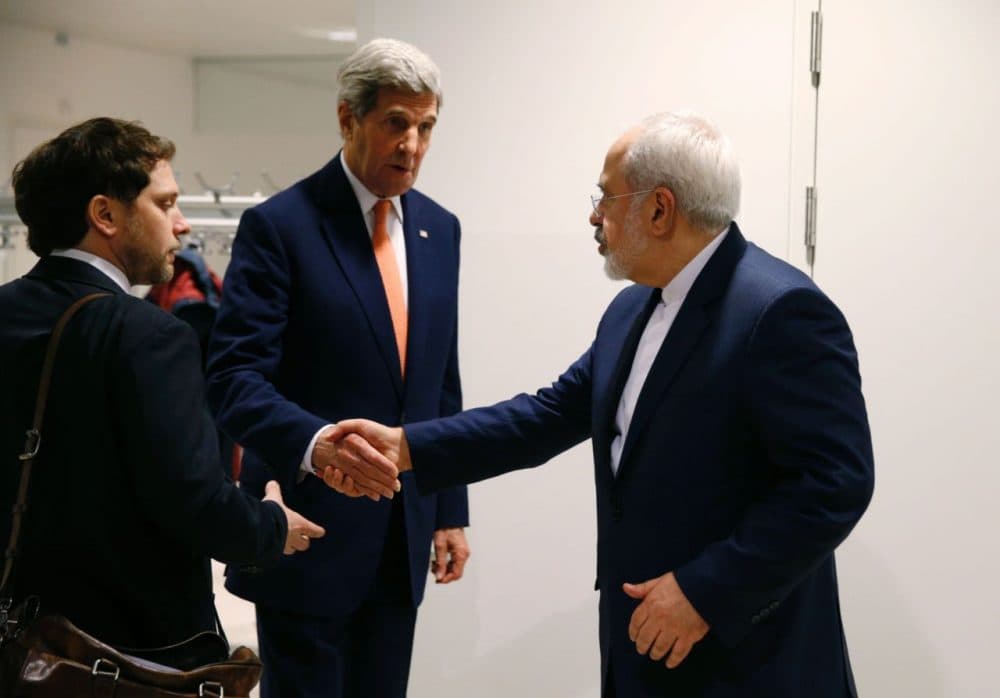Advertisement
Sanctions Lifted As Iran Fulfills Nuclear Deal
Resume
This week Iran reemerges as a powerful player in regional diplomacy. Free from international sanctions over its nuclear program, the country will enjoy a more open relationship with the U.S.
How significant is this shift, and what are the new challenges for American diplomats who have spent nearly a decade getting to this point?
Here & Now's Robin Young discusses relations between the U.S. and Iran with Nicholas Burns, professor of diplomacy at the Harvard Kennedy School of Government.
Interview Highlights: Nicholas Burns
What was your reaction to the lifting of sanctions and release of U.S. prisoners?
“This is historic, a big step forward for the United States and Iran. Our two countries have been estranged for 35 years since the hostage crisis of 1979, we’ve gone to the brink of war because of Iran’s nuclear program. I think thanks to President Obama and Secretary of State John Kerry, they took a chance on negotiations and I think this deal makes sense to the United States. It avoids an Iranian nuclear weapon, but we accomplished it through negotiations and not through the force of arms.”
What is your response to Republican presidential candidates' criticism of the deal?
“I think this was a difficult compromise and there are real risks attached to this because it could be that the Iranian National Guard, the hardline movement in Iran, might try to take Americans hostage in the future, but the hostages had been held for a long time and they’d been held unjustly in Iran. President Obama felt he had an obligation to get them back. It was a bitter pill to swallow, that seven Iranian-Americans in jail in the United States for violating our sanctions would now receive clemency. But I think on balance, it was the right decision for President Obama.”
Do you trust the nuclear deal?
“I do. I’ve supported the nuclear deal. As you’ve mentioned, I worked on Iran diplomacy for Secretary Condoleezza Rice in the Bush Administration, as a career foreign service officer. I’ve always felt that we are better off trying diplomacy first, and if we don’t succeed we can always resort, if necessary, to the use of force. But here we’re going to be able to see Iran’s nuclear program frozen for the next 10 to 15 years. They won’t have the ability to produce a nuclear weapon, that’s a decided advantage for the United States. And the fact is that there will be very tough international inspections of Iran’s regime. It will not be easy for them to cheat and trim on this deal - they may try, but the world is going to be watching as they do that. We’re going to have the support of our European allies, of the Russians and Chinese, of most of the Arab countries in implementing the nuclear deal.”
What are your concerns on the fact that Iran can now export oil?
“This was one of the major compromises that we had to make in return for Iran disassembling its nuclear weapons program, the Iranians get sanctions relief. As part of sanctions relief, Iran can return to the global energy markets. It’s a major producer of oil and gas, but prices are low right now, particularly for oil. So the Iranians are not going to accrue the kind of windfall they had anticipated a couple of years ago. And frankly, I think that’s a benefit for us. It’s certainly a benefit for consumers to have lower prices for gasoline. It’s also a benefit not to see an inordinate amount of money go to the Iranian government to finance their nefarious activities in the region.”
What happens if releasing sanctions does not provide the help Iran was hoping for?
“It’s not a sure thing. It’s true that Iran is a very young country demographically. The public opinion polls show that the Iranian people, by and large, are not profoundly anti-American. They’re a trading culture, they’re entrepreneurial, and they want to be reintegrated into the global economy. Their young people want to be able to travel for the first time and they want to see their economy lifted, so there is a possibility that the reformist wing of the government will be strengthened by Iran’s reentry into the global market. But the reactionary wing, the people who are running guns to terrorist groups in the Middle East, right now I think they’re a little bit stronger. I actually don’t know what impact the nuclear deal will have on Iran’s internal political developments, but I think that Secretary Kerry has been right to say ‘look, we’ll challenge Iran to work more productively and constructively on the Syrian civil war or on Yemen, but we’ll have our guard up to defend against Iran in the region.’ I think that’s the only proper thing for the U.S. to do.”
Guest
- Nicholas Burns, former U.S. ambassador to NATO and former under secretary of state. He’s now a professor of diplomacy at the Harvard Kennedy School of Government. He tweets @rnicholasburns.
This segment aired on January 18, 2016.